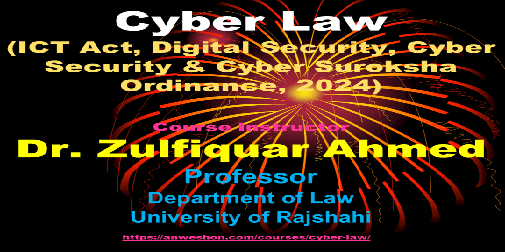
About Course
Students should have a basic understanding of Constitutional Law, Criminal Law and the Law of Evidence.
This course aims to provide you with a strong practical and theoretical understanding of cyber Law, cyber security, cyber crimes-hacking, digital forensics, security operations and the underlying associated with ICT act, 2006, Digital Security/Cyber Security/Cyber Suroksha Ordinance, 2024.
The primary objective of the Cyber Law course is to familiarize students with ‘ICT in the arena of law,’ which would encompass the entire relationship between law and cyberspace. The course would cover introductory concepts of cyberspace, digital rights and responsibilities, freedom of expression online, media freedom and right to information, misinformation and disinformation, infodemic, privacy and data protection, legal aspects of Big Data and Artificial Intelligence, cybercrimes and cyber security, transparency of mass-surveillance, jurisdictional issues over internet, e-governance, tech contracts, and intellectual property. The course would also examine the potential uses of ICT by attorneys and the effects of ICT on legal practice. An attempt would be made to briefly introduce students to the issues underlying the concept of cyber law – a field that examines the application of information technologies to the practice of law – as a cross-disciplinary field. Thus, students will be exposed to the contested narratives of the most recent information and communication technologies used to enhance the functions of litigation, as well as the critical issues arising from their use.
Suggested Reading
ডঃ জুলফিকার আহম্মদ, সাইবার আইনঃ তত্ত্ব ও বিশ্লেষণ, মুহিত পাবলিকেসন্স, ঢাকা (২০১৪)।
Dr. Zulfiquar Ahmed, A Text Book of Cyber Law, Dhaka (2007).
